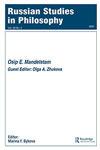《初始定义》中的悖论思想
IF 0.1
4区 哲学
Q4 Arts and Humanities
引用次数: 0
摘要
摘要在这段摘录中,Vladimir S.Bibler试图表明,1660年代形成的力学的最初概念是矛盾的;它们导致了相互矛盾的概念。然而,这种悖论直到二十世纪末才被揭示出来。当概念在自我辩护中转向自身时,悖论就会出现,就像集合论的悖论一样。根据Bibler的说法,这是因为任何理论体系的“开端”都具有悖论性质,因为它们与先前存在的和未来的“开端“接壤。Bibler讨论了在将伽利略和康德的原理联系起来时悖论的揭示,因为康德理解了伽利略对运动的新理解,即惯性运动,这掩盖了相互矛盾的决定。他给出了悖论的定义,在这个定义中,一个推论完全否定了它自己的前提。本文章由计算机程序翻译,如有差异,请以英文原文为准。
The Idea of Paradox in Initial Definition
ABSTRACT In this excerpt, Vladimir S. Bibler attempts to show that the initial concepts of mechanics that were formulated in the 1660s are paradoxical; they result in contradictory concepts. However, this paradox was revealed only in the late twentieth century. When concepts turn to themselves in self-justification, paradoxes arise, as in the paradox of set theory. According to Bibler, the reason for this is the paradoxical nature of any theoretical system’s “beginnings,” because they border on preexisting and future “beginnings.” Bibler discusses the revealing of paradoxes in correlating the principles of Galileo and Kant, in the fact that Kant comprehended Galileo’s formulation of a new understanding of motion as inertial motion, which concealed contradictory determinations. He provides a definition of paradox in which a deduction completely refutes its own premises.
求助全文
通过发布文献求助,成功后即可免费获取论文全文。
去求助
来源期刊

RUSSIAN STUDIES IN PHILOSOPHY
PHILOSOPHY-
CiteScore
0.10
自引率
0.00%
发文量
14
期刊介绍:
Russian Studies in Philosophy publishes thematic issues featuring selected scholarly papers from conferences and joint research projects as well as from the leading Russian-language journals in philosophy. Thematic coverage ranges over significant theoretical topics as well as topics in the history of philosophy, both European and Russian, including issues focused on institutions, schools, and figures such as Bakhtin, Fedorov, Leontev, Losev, Rozanov, Solovev, and Zinovev.
 求助内容:
求助内容: 应助结果提醒方式:
应助结果提醒方式:


